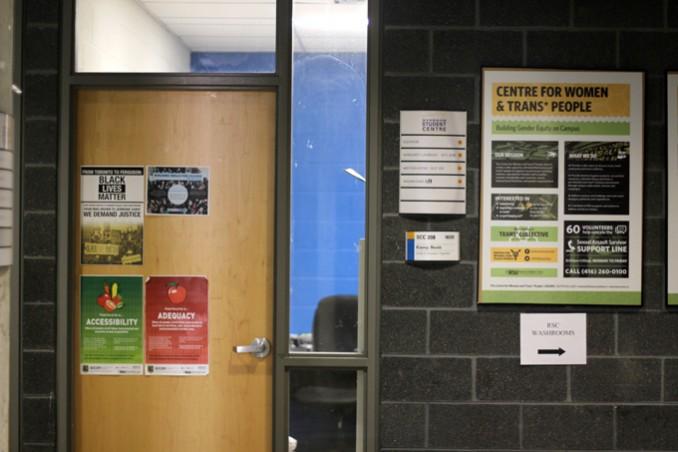Clarification: A previous version of this story did not include comment from CESAR, who reached out to the Eyeopener after we did not reach them prior to publication. The article has been updated to reflect their stance on the Equity Service Centres and the RSU.
By Nicole Schmidt and Keith Capstick
This summer, some of the Ryerson Students’ Union (RSU) equity service centres will be left unstaffed and empty.
The RSU recently decided that both the Racialised Students’ Collective and RyeAccess won’t remain open through the summer months. Staff members from both centres are troubled by the move and say the need for these services doesn’t end with the academic year.
“Marginalized students don’t disappear in the summer. We don’t just stop going to school, we don’t just stop existing in these spaces and there’s still things we need support on,” said Sydney Drmay, a part-time staff member at RyeAccess. “To not have spaces for people in the summer just implies that in the summer they don’t matter.”
Last summer, all six centres remained open. Natasha Campagna, the RSU general manager, said 2015 was the first year the RSU was able to hire a full equity staff for the summer because of additional funding from the Continuing Education Students’ Association of Ryerson (CESAR), which was not provided this year.
The equity service centres are co-funded by CESAR and the RSU. Denise Hammond, president of CESAR, said in an emailed statement that she was not aware of the summer closures.
“It is entirely disappointing that the RSU would allege CESAR is withholding funding and is at fault for the closure. Last year CESAR renegotiated a contract that increased funding for joint services, that contract remains in place, despite the RSU not adhering to its basic terms,” Hammond said.
Hammond said that CESAR was not asked if they could contribute more funding to the equity centres for the summer.
In April 2015, the two unions signed a contract binding them together in the staffing of the equity service centres. According to a financial statement provided by CESAR, the full amount for the fiscal year (May 2015 to April) outlined in the contract was paid to the RSU in June 2015.
A disconnect in communication created several conflicts between the unions, including a delay in providing opt-out cheques.
This disconnect escalated after controversy regarding the RSU’s restructuring process, when former executive directors of communications and outreach Gilary Massa and Dina Skvirsky were laid off. CESAR announced that their board of directors had passed a motion boycotting the RSU-run CopyRite print service centre.
“CESAR is not financially contributing to this irresponsible and anti-union student executive,” read a CESAR statement from the announcement.
Hammond said that although the motion to boycott CopyRite was passed in an effort to reduce RSU profits, CESAR is still fully committed funding joint services of the two students’ unions, including the Equity Service Centres.
“Despite our political differences with the RSU … CESAR has and will continue to support the Equity Service Centres operations financially and otherwise,” she said.
Funding discrepancies and issues related to workplace privacy and student relations have also posed challenges within the equity centres over the past year.
“If [a student] came to anyone on the staff or on the board with a problem or an issue that their needs are not being met because of a centre not being open, we would do whatever we can to ensure we are helping that student,” Campagna said. “Just because the centre isn’t open doesn’t mean that we’re going to deny service and say we can’t help.”
RSU vice president equity Rabia Idrees added that programs running during the summer tend to have lower turnout, which can contribute to budget issues during the school year.
But Drmay said the number of students visiting the equity centres last summer was steady. They added that some centres were able to break ground on programming that is difficult to start up during the school year, like Green Minds — a new initiative aimed to engage students with nature to promote good mental health and well-being.
In February, each centre was asked to create a proposal outlining plans for the summer, to be submitted for evaluation by March 14.
After submitting their application, Drmay said they were hopeful for RyeAccess’ summer programming to continue this year, but have since become less optimistic.
“I had my proposal in at the beginning of March outlining all the things that RyeAccess does in the summer and things we could continue doing,” Drmay said. “As far as I know it got accepted and looked at but I guess it wasn’t convincing enough.”
The Trans Collective was also planned to close for the summer, but pushback from the collective and its members resulted in an additional hire. Evan Roy, a coordinator at the Trans Collective, said they’re not going to take “one victory as a victory for all.” Not hiring coordinators for every centre, they added, is a “huge oversight.”
Campagna said that during the summer, a lot of students aren’t RSU full-time students. “We wouldn’t be catering to our membership directly by having the centres open,” she said. Idrees said the university also provides equity services that help students.












Leave a Reply